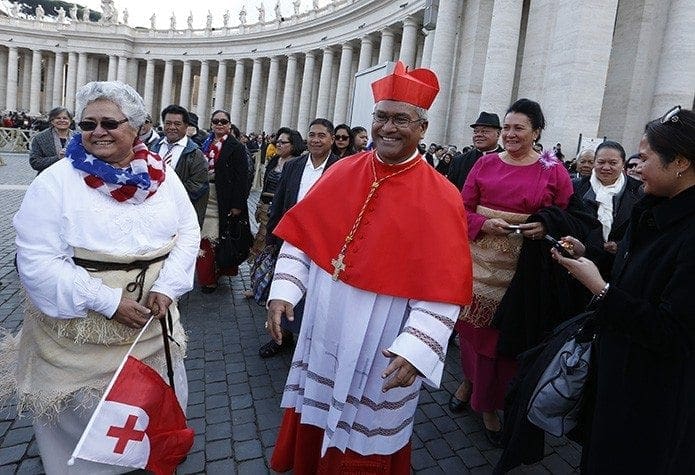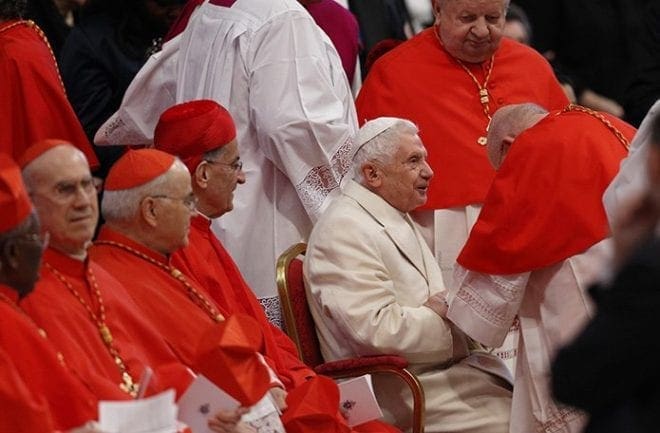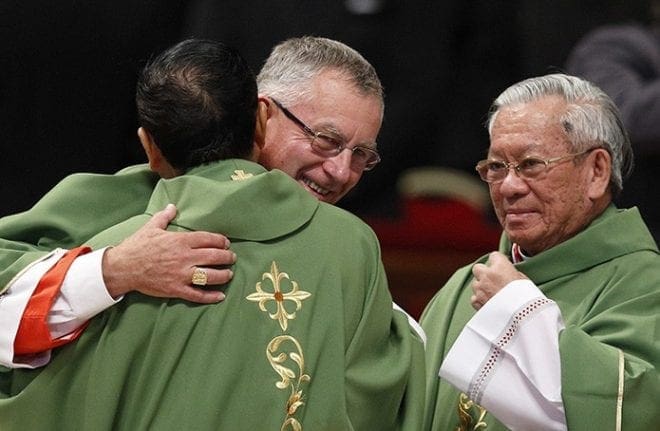 CNS photo/Paul Haring
CNS photo/Paul HaringVatican City
Becoming a cardinal is a call to greater love, patience, pope says
By CINDY WOODEN, Catholic News Service | Published February 19, 2015
VATICAN CITY (CNS)—In a Valentine’s Day ceremony to create 20 new cardinals, Pope Francis offered a meditation on Christian love and, especially, what it means for those who guide and minister in the church.
“The greater our responsibility in serving the church, the more our hearts must expand according to the measure of the heart of Christ,” he said Feb. 14 during the consistory, a prayer service during which he personally welcomed 19 churchmen into the College of Cardinals.
The 20th new cardinal, 95-year-old Colombian Cardinal Jose Pimiento Rodriguez, retired bishop of Manizales, was unable to attend the ceremony and was to receive his red biretta—a three-cornered hat—and his cardinal’s ring in his homeland.
Retired Pope Benedict XVI attended the ceremony, sitting in the front row of St. Peter’s Basilica alongside the already existing members of the College of Cardinals.
Famous passage on love applies to church pastors, including pope
Pope Francis’ meditation at the ceremony focused on the famous passage about love from St. Paul’s First Letter to the Corinthians (13:4-7), which begins: “Love is patient, love is kind.”

Retired Pope Benedict XVI greets a cardinal before a consistory at which Pope Francis created 20 new cardinals in St. Peter’s Basilica at the Vatican Feb. 14. CNS photo/Paul Haring
“All of us, myself first,” should be guided by St. Paul’s words, he said, because every Christian ministry “flows from charity, must be exercised in charity and is ordered toward charity.”
The patience Christian love calls for, he said, is a call to catholicity. “It means being able to love without limits, but also to be faithful in particular situations and with practical gestures. It means loving what is great without neglecting what is small.”
St. Paul says love is “not jealous or boastful” and truly being neither, the pope said, “is surely a miracle of love since we humans—all of us, at every stage of our lives—are inclined to jealousy and pride since our nature is wounded by sin.”
Not being “irritable or resentful” can be a challenge for a pastor, especially when dealing with other clerics, Pope Francis told the new cardinals.
“Charity alone frees us” from the temptation of snapping at others and, especially, from “the mortal danger of pent-up anger, of that smoldering anger which makes us brood over wrongs we have received,” he said. “This is unacceptable in a man of the church.”
St. Paul’s statement that love rejoices over what is right, the pope said, means “those called to the service of governance in the church need to have a strong sense of justice, so that any form of injustice becomes unacceptable, even those which might bring gain to himself or to the church.”
The new cardinals and all Christians, he said, can find a synopsis of their calling in St. Paul’s affirmation that love “bears all things, believes all things, hopes all things, endures all things.”
Christians, the pope said, should be “persons always ready to forgive; always ready to trust, because we are full of faith in God; always ready to inspire hope, because we ourselves are full of hope in God; persons ready to bear patiently every situation and each of our brothers and sisters, in union with Christ, who bore with love the burden of our sins.”
Seek out the sick, wounded, shunned, pope says
With the creation of the 20 new cardinals, the College of Cardinals expanded to 227 members, 125 of whom are under the age of 80 and therefore eligible to vote in a conclave to elect a new pope.
After the new cardinals professed their faith by reciting the Creed and formally swore fidelity and obedience to the pope and his successors, they approached Pope Francis one by one to receive their biretta, their cardinal’s ring and the assignment of a “titular” church in Rome, which makes them part of the Roman clergy.

New Cardinals John Dew of Wellington, New Zealand, and Charles Bo of Yangon, Myanmar, exchange the sign of peace during a Mass with Pope Francis and new cardinals in St. Peter’s Basilica at the Vatican Feb. 15. At right is new Cardinal Pierre Nguyen Van Nhon of Hanoi, Vietnam. The pope created 20 new cardinals at a consistory the previous day. CNS photo/Paul Haring
The new cardinals met with Pope Francis Feb. 12-13 to review ideas for the reform of the Roman Curia and Vatican finances as well as the progress made in the work of the Pontifical Commission for the Protection of Minors.
Capping the four-day gathering was a Mass Feb. 15 celebrated by the pope in St. Peter’s Basilica with 19 of the churchmen who received their red hats the day before and with about 140 other members of the College of Cardinals.
Pope Francis said, “The way of the church is precisely to leave her four walls behind and to go out in search of those who are distant, those essentially on the outskirts of life.”
The Catholic Church cannot call itself church if it is a “closed caste” where the sick, the wounded and sinners are shunned, Pope Francis told the 20 new cardinals he created.
“Total openness to serving others is our hallmark; it alone is our title of honor,” he told the men often referred to as “princes of the church.”
Even Pope Francis’ choice of new cardinals emphasized his focus on geographical peripheries and outreach to those often excluded from society. The 20 new cardinals came from 18 countries, including the first-ever cardinals from Tonga, Myanmar and Cape Verde. In his second round of naming cardinals, he once again skipped large Italian dioceses usually headed by cardinals—notably Venice and Turin—and tapped Ancona and Agrigento, which is led by now-Cardinal Francesco Montenegro, a dedicated defender of the thousands of immigrants who risk their lives crossing the Mediterranean Sea to Europe. Only one of the cardinals works in the Roman Curia: French Cardinal Dominique Mamberti, head of the Apostolic Signature, the Vatican’s highest court.
In the almost two years since his election, Pope Francis repeatedly has called Catholics to reach out to people on the margins of both the church and society. He also frequently cautions against the temptation of being modern-day scribes and Pharisees, who can allow obedience to the letter of the law to prevent them from reaching out to others with compassion.